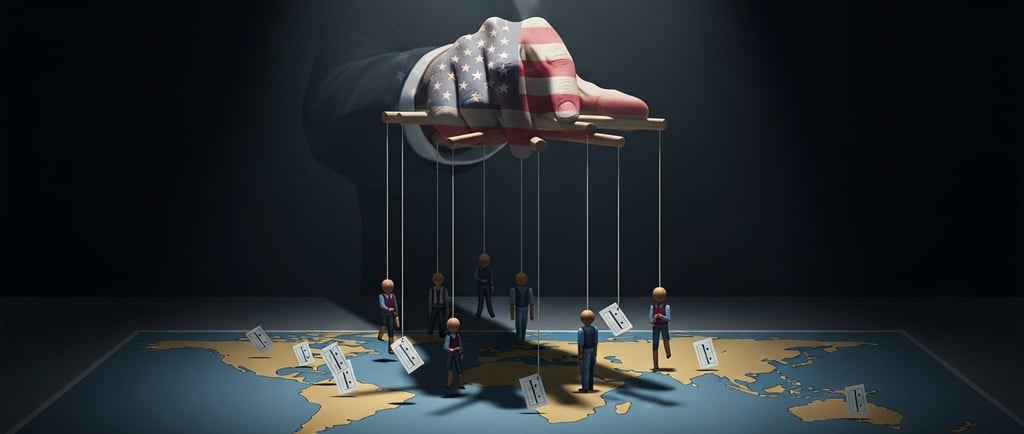Unintended Influence? U.S. Government Investigates USAID's Role in Foreign Elections
A wave of concern and scrutiny is washing over Washington following the revelation of a potentially explosive issue: the alleged use of the United States Agency for International Development (USAID) to influence elections in foreign nations.
Cristian Ianowich
8/7/20253 min read


A wave of concern and scrutiny is washing over Washington following the revelation of a potentially explosive issue: the alleged use of the United States Agency for International Development (USAID) to influence elections in foreign nations. These discoveries, reportedly uncovered during an internal audit and subsequent intelligence briefings, have sent shockwaves through the halls of power, raising serious questions about the agency’s operational oversight and the broader implications for U.S. foreign policy.
While USAID’s stated mission is to support democratic processes, provide humanitarian aid, and foster economic development globally, the notion that its funds or programs may have been inadvertently or deliberately used to sway electoral outcomes abroad has ignited a firestorm. Let's delve into what we know so far and the potential ramifications of these findings.
The Allegations: What Has Been Discovered?
Details remain scarce as investigations are reportedly ongoing. However, preliminary reports suggest several potential avenues of concern:
Funding of Local Organizations: USAID often partners with local non-governmental organizations (NGOs) to implement its programs. The audit reportedly identified instances where funding may have been directed towards groups that were actively involved in political campaigns or partisan activities, blurring the lines between development work and electioneering.
Civic Education Programs: While designed to promote democratic participation, some civic education initiatives funded by USAID may have inadvertently favored specific political viewpoints or parties in the countries where they were implemented. The investigation is likely examining the neutrality and impartiality of these programs.
Media and Information Initiatives: USAID supports various media outlets and information dissemination projects aimed at promoting transparency and countering disinformation. Concerns have been raised that some of these initiatives may have been used to promote or denigrate specific political candidates or parties in the lead-up to elections.
It is crucial to note that these are still allegations under investigation. The extent to which any intentional or unintentional influence occurred, and the specific countries involved, are yet to be fully disclosed.
Why This Matters: The Implications are Far-Reaching
The potential consequences of USAID involvement in foreign elections, whether intentional or accidental, are significant and could have lasting repercussions:
Undermining Democratic Legitimacy: If a foreign power is seen as meddling in a nation's elections, it can erode public trust in the democratic process and the legitimacy of the elected government. This can lead to instability and resentment towards the interfering nation.
Damage to U.S. Credibility: The United States often positions itself as a champion of democracy and the rule of law. Findings of USAID involvement in foreign elections would severely damage its credibility on the global stage and could be used by adversaries to undermine U.S. foreign policy objectives.
Impact on Foreign Relations: Accusations of election interference can strain diplomatic relations with the countries involved, potentially leading to retaliatory measures or a cooling of ties.
Legal and Ethical Questions: Depending on the nature and extent of the involvement, there could be legal ramifications both domestically in the U.S. and internationally. Ethically, such actions would violate the principle of national sovereignty and self-determination.
Risk to USAID's Mission: The integrity and neutrality of USAID are paramount to its ability to effectively carry out its development and humanitarian work. Allegations of political interference could jeopardize its partnerships and undermine its overall mission.
Potential U.S. Government Reactions and Consequences
The U.S. government is likely to respond to these findings with a multi-pronged approach:
Thorough Investigations: Expect intensive investigations by relevant government agencies, including USAID's Inspector General, Congressional committees, and potentially the Department of Justice, to determine the facts and the extent of any wrongdoing.
Increased Oversight and Accountability: Reforms in USAID’s operational procedures and grant-making processes are likely to be implemented to enhance oversight and prevent future occurrences. This could include stricter guidelines for partner organizations and more rigorous monitoring of program activities.
Diplomatic Efforts: The U.S. government may need to engage in diplomatic damage control with the countries where interference is alleged to have occurred, potentially leading to apologies or commitments to prevent future incidents.
Potential Legal Action: If evidence of intentional and illegal activity is found, individuals or organizations involved could face legal prosecution.
Re-evaluation of Foreign Policy Strategy: The findings could lead to a broader re-evaluation of how the U.S. supports democracy and development abroad, with a greater emphasis on ensuring the neutrality and non-interference of its programs.
The unfolding situation presents a significant challenge to the United States' standing in the world and underscores the delicate balance between supporting democracy and respecting national sovereignty. The coming months are likely to reveal more details and the long-term consequences of these alleged actions.
